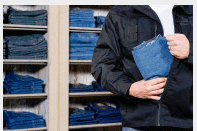 It always seems that as we get into the 4th quarter, cases of internal theft seem to rise. Every year for the past 8, I’ve dreaded the case load that I know will be coming in the next three months. While it is impossible for me to predict, with any certainty, internal theft cases at any point in the year, I can always guarantee that each one of my 29 stores will have at least one case in the next three months. Good thing I’ve got my bags packed.
It always seems that as we get into the 4th quarter, cases of internal theft seem to rise. Every year for the past 8, I’ve dreaded the case load that I know will be coming in the next three months. While it is impossible for me to predict, with any certainty, internal theft cases at any point in the year, I can always guarantee that each one of my 29 stores will have at least one case in the next three months. Good thing I’ve got my bags packed.
I would almost bet that I’m not alone here. Those of you reading this right now have experienced the same thing. Yeah, sure, we see employee theft cases all year long, but why do they seem to increase during the end of the year? Are more people just desperate to satisfy those wish-lists? Is it driven by greed for the season’s hot new electronics? Is it our temporary associates, who may not receive a background check? Probably a little bit of all of those.
Holidays bring pressure, especially if you have a family. Even more so if you are struggling financially. Those children surely need a new tablet, even though rent may take up an entire 2 weeks’ salary. Let’s not forget about utilities and groceries, clothes and other essentials. If someone is desperate enough, Santa will pass, but it will be on your dime. I grew up in poverty. My father worked long hours for minimum wage, and my mother raised 3 kids. When the holidays came around, I can remember my mother taking on temp work and my dad taking on another job. Nowadays, it seems as that type of work ethic is completely unheard of. Why work yourself to death, when you could just steal what you want.
Our employees also have greater access to product. Even before that new tablet hits the display, an employee has to take it off the delivery truck. Chances are, these receiving employees are grossly unsupervised, and can simply cart it out the back door. Just last week, I had a case where two guys were doing just that. They had bilked the store for nearly $10k in product that never made it to the sales floor. The managers learned a very hard lesson about supervision, as well as back door procedures. Employees also learn our system and understand where our weaknesses are. Last year (same store as the first example), the hard-goods employees (all 10 of them) were taking cash payments from customers and loading up bulk items like treadmills, ride-on toys, and basketball goals. The store has a procedure in place for a supervisor to verify all receipts prior to bulk items being taken out. The store was not following this program and it costs them well over $75k.
Temporary workers are another pain in my side. Obviously, we need the additional support in the 4th quarter. Hiring is essential, but hiring the right person is even more so. My company waives the background check process for temporary hires. It’s the reason I’m bald at 28. There are better alternatives out there. I know a ton of other retailers also have this practice. It’s not good for business. Yes, these people are only working for you for a limited amount of time, but they can do serious damage in that time. Just last year, two temporary cashiers embezzled nearly $30k in one of my stores by processing fraudulent return transactions. Upon their arrest, we saw on their criminal records that each had multiple arrests for embezzlement and shoplifting. They would have never been offered employment outside of the temp hire period.
There is no quick fix, or simple solution to employee theft. As managers and business owners, you have to take proactive steps to minimize your losses. Employees will always find ways to steal from you; it’s your job to make it increasingly difficult for them to do so. The key to a strong 4th quarter is clearing your store of product, just not through the backdoors.






